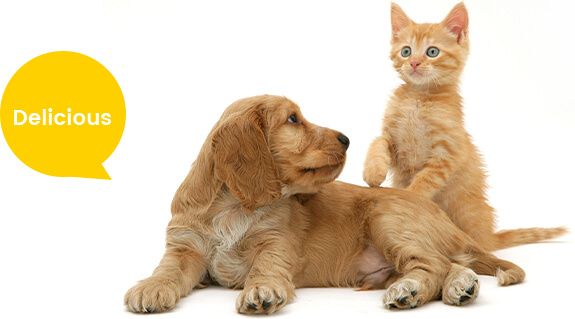
Want to hear from us?
Sign up to receive our latest email news, offers and updates.
News and Events
June 21, 2022If it’s Good for Me, is it Good for My Dog? The answer to that question is not a resonating “NO!!”, but rather: “not really”.
Dogs have relied on our leftovers ever since they were domesticated, thousands of years ago, so, as a rule of thumb, everything we can eat they can also eat. This rule has two very important exceptions:
1) Human food is not balanced according to canine needs; therefore, it is wise to provide your dog with a designated complete commercial formula. Complete diets contain all the nutrients dogs need and can be fed exclusively for the dog’s entire life. So, can we feed our four-legged furry friend people food? Well, we don’t have to, but we can. If one does decide to do so, in order the prevent dietary imbalance, at least 85% of the dog’s caloric intake should be from a balanced commercial diet. The remaining 15% of calories can be from anything we eat, excluding those foods mentioned in rule 2.
2) Anything that humans are not supposed to eat should not be given to our dogs. In addition, there are a number of foods that are human friendly, but are hazardous for dogs:
a) Chocolate – Cocoa beans contain a naturally occurring chemical called theobromine. The substance is related to caffeine and it is what gives chocolate its stimulating properties. In fact, theobromine is responsible for the euphoric and uplifting feeling some people get when eating chocolate. However, the same substance is toxic to dogs. It adversely affects their nervous system and at large doses can even kill a small dog.

b) Onions and garlic – These foods are more toxic to cats, but are also poisonous for dogs when consumed in large amounts. Onions and garlic contain compounds that may affect red blood cells and cause severe anemia. While cats should be kept away from these foods totally, dogs can tolerate small amounts.

c) Grapes and raisins – Some dogs may suffer from kidney damage after consuming grapes or raisins. The toxic mechanism is unclear, and does not affect all dogs, but it is recommended to avoid giving these foods to dogs out of abundance of caution.
d) Macadamia nuts – consumption of a large amount of these nuts can cause damage to the peripheral nervous system in dogs, and should be avoided.

Even though rule 2 forbids us to feed our pets with foods we shouldn’t eat ourselves, just in case this wasn’t clear enough, the following items are sometimes given to dogs anyway, and should be avoided:
a) Raw animal-based products – Eggs, meat, chicken and fish that you wouldn’t eat raw, are not recommended for your dog. True, dogs are descendants of wolves, who don’t cook their prey, but they are not wolves anymore. Dogs may be susceptible to contagious diseases that can be transferred by consuming raw products. However; the real reason is, that there have been many cases where dog owners have become ill either by handling their dog’s raw food, or from the dog itself, which had become a carrier after eating uncooked food. This category includes raw eggs, not only for the aforementioned reasons, but also because raw eggs contain a substance called avidin which can interfere with the important vitamin biotin, and cause biotin deficiency. Avidin is destroyed when eggs are cooked.
b) Bones – Chicken and fish bones can cause physical harm to the digestive tract, which can manifest as perforation or obstruction. Granted, many dogs eat bones with no adverse consequences, but it just isn’t worth the risk. In addition, if you have a long-muzzled dog like a Collie or German Shepheard, don’t give them leg bones cut into a ring. The bone can become stuck on the dog’s lower jaw while playing with it, causing severe distress. The dog can injure itself while frantically trying to dislodge the bone. Have the butcher saw the ring into two half rings.
c) Pits from apples, cherries, apricots, plums and peaches contain a toxic substance which turns into cyanide in the digestive tract. All animals and humans should refrain from consuming these pits.
Additional foods that can be harmful:
a) Dairy products – dogs have no problem eating any and all dairy products. That being said, just like people, some dogs are lactose intolerant and for them, consumption of dairy products can cause diarrhea and upset stomach. Lactose intolerance is uncommon and should be diagnosed by a veterinarian. For these patients, dairy products that do not contain lactose are tolerable.
b) Potatoes – contrary to common belief, there is no problem feeding dogs potatoes, however dogs and humans alike should avoid eating potatoes that have turned green in storage. The green parts may contain solanine, a highly toxic compound.
c) Unbaked dough – If you’re baking and you leave your dough out to rise, make sure your dog can’t get to it. If swallowed, the dough may rise in the dog’s gut, putting the dog at severe risk.
In summary, it’s recommended to feed your dog with a commercial balanced diet, and refrain from sharing your food with your dog. There is an abundance of dog snacks designed to break your dog’s boring culinary routine.However, if you do decide to give your dog people food, just limit the amount and avoid prohibited foods.
Post by:sandy@chaotaipet.com 2022/06/21

Want to hear from us?
Sign up to receive our latest email news, offers and updates.
